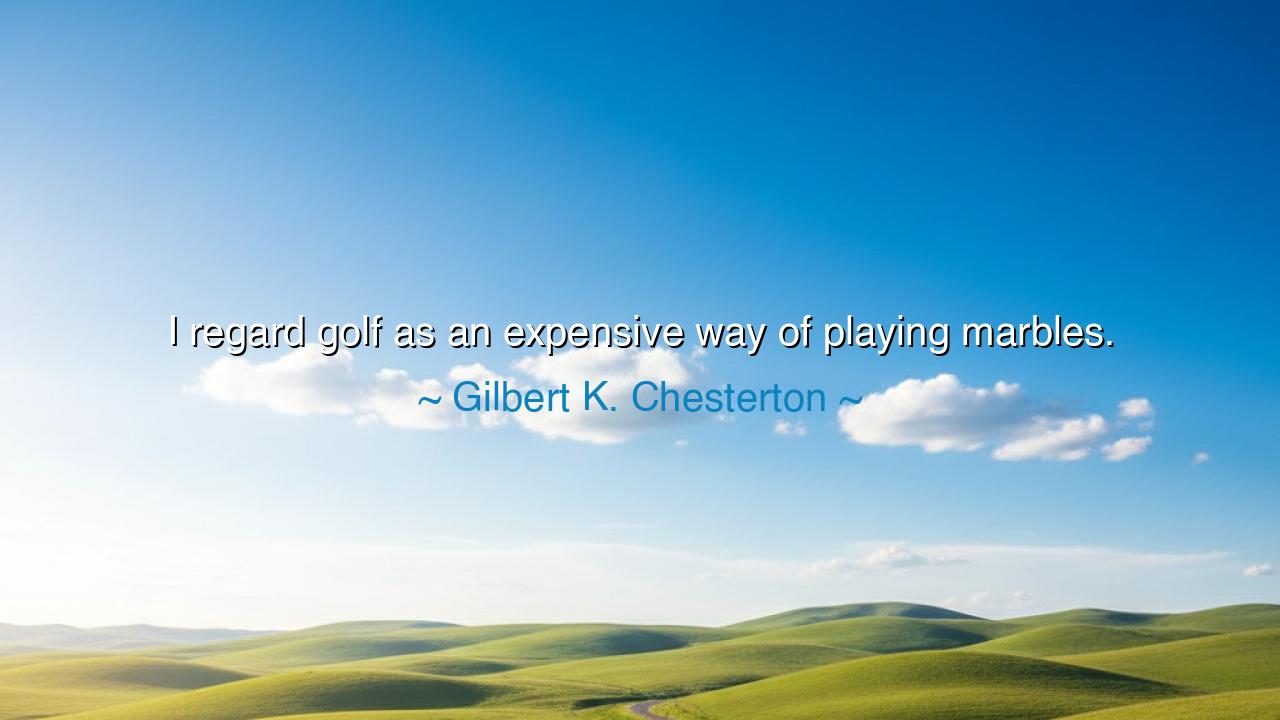
I regard golf as an expensive way of playing marbles.






When G.K. Chesterton, the master of paradox and wit, declared, “I regard golf as an expensive way of playing marbles,” he was not merely dismissing a sport, but unveiling a truth about human vanity, simplicity, and the strange ways we complicate life. In these words, Chesterton mocked the seriousness with which men approached a game that, at its essence, resembled the childhood pastime of flicking marbles across the ground. What he saw was the human tendency to take something simple, inflate it with wealth and pomp, and then treat it as noble pursuit.
The origin of this quote lies in Chesterton’s gift for seeing the comic side of life’s pretenses. Known for his essays that pierced the pride of modern society, he often revealed how men, in their quest for sophistication, merely disguised the child within. To him, golf was little more than childhood play dressed up in fine clothes and played on manicured fields, with costs that placed it beyond the reach of the poor. His remark is humorous, yes, but it also carries critique: why must we make leisure into luxury, and why must we pretend that our games are grander than they are?
The ancients would have understood his wisdom. The Greeks delighted in their games, but they also knew the difference between contests of true excellence and the diversions of children. To compare golf to marbles is to remind us that adulthood often disguises play as something noble, forgetting that at heart it is still play. The man with the club and the ball is not so different from the boy with a marble in the dirt; only the cost and the pretense have changed. Chesterton, in his laughter, sought to strip away illusion and show life in its simple form.
Consider how this truth has played out in the lives of the wealthy. In the early twentieth century, golf became a symbol of privilege, played at country clubs closed to the poor, the immigrant, and the outsider. Yet while fortunes were spent on clubs, caddies, and sprawling courses, the essence of the game remained: strike a ball, chase it, and send it toward a hole. At the same time, in alleys and schoolyards, children without money played marbles, engaged in contests of skill and precision that carried the same spirit. Chesterton’s quip exposed this irony: the rich, in their luxury, were merely children playing a game they could have known for free.
The lesson is clear: do not let wealth and pretense disguise the simplicity of joy. Life’s truest pleasures are often those we knew as children—laughter, play, companionship, and the test of skill. To pour riches into these does not make them greater; it only hides their simplicity. Chesterton’s words remind us to see through appearances, to strip life back to its essence, and to remember that joy is not purchased, but lived.
What then must we do? First, approach leisure with humility. Do not confuse expense with worth, nor grandeur with joy. Second, rediscover the spirit of childhood: find pleasure in simple things, in games that test the hand and cheer the heart, without needing wealth to sanctify them. Third, beware of pride that disguises play as sophistication; remember that all men are but children grown tall, seeking delight in contests small and great.
Thus, Chesterton’s playful wisdom endures: “Golf is an expensive way of playing marbles.” It is a call to laugh at ourselves, to recognize the child within, and to remember that life’s beauty lies not in cost but in simplicity. May we, then, play our games with joy, not pretense; with laughter, not pride. For when we see life as it truly is—a divine gift dressed often in humble play—we free ourselves from vanity and rediscover the happiness that even children with marbles have always known.






AAdministratorAdministrator
Welcome, honored guests. Please leave a comment, we will respond soon